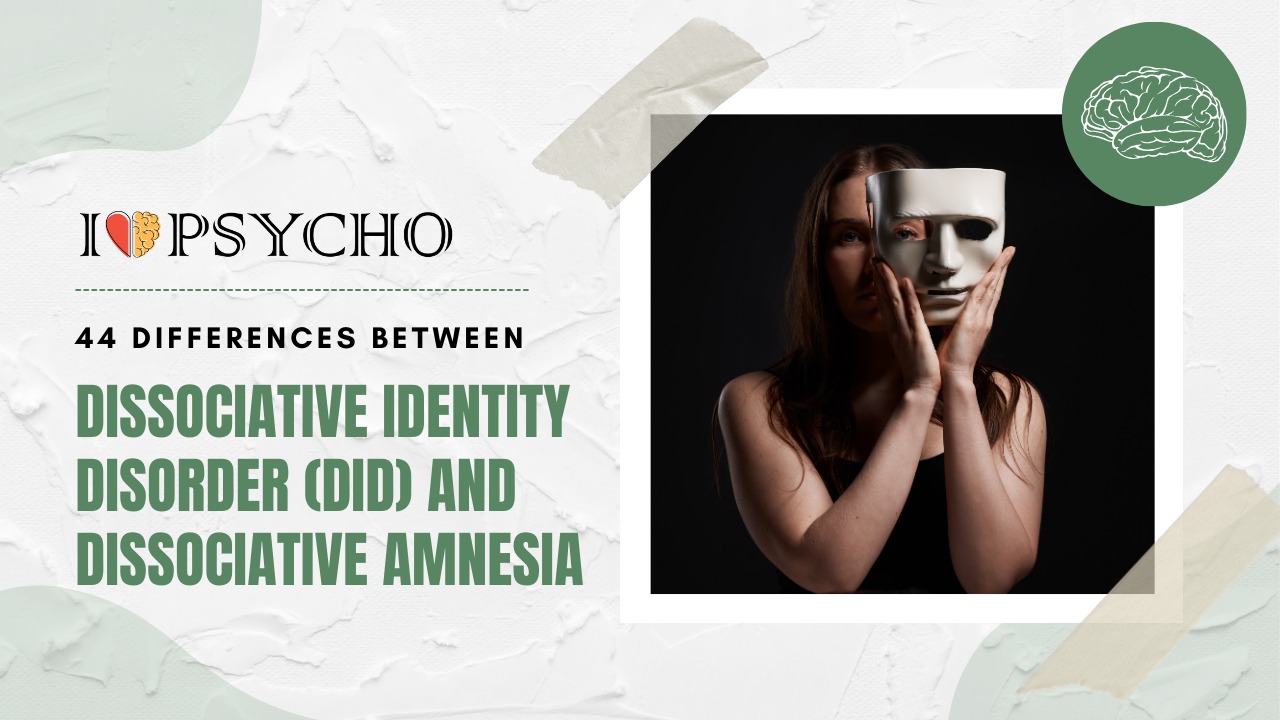Psychological problems include Dissociative Identity Disorder (DID) and Dissociative Amnesia. These illnesses affect memory, identity, and awareness, although they have different symptoms. Dissociative Identity Disorder (DID): DID, formerly known as multiple personality disorder, is a complicated illness that causes two or more personality states in an individual. Alters are different personas with distinctive qualities, behaviors, memories, and physiological responses. DID sufferers may have memory gaps, forgetfulness, and personality confusion.
The disease generally develops as a coping strategy after severe childhood trauma. Psychotherapy, especially DBT or EMDR, is used to treat DID. Dissociative Amnesia: Traumatic situations might cause an individual to forget critical personal information. Memory loss beyond normal amnesia can be localized (particular events or periods are lost), selective (just some features of a traumatic event are forgotten), generalized (one’s whole life history is forgotten), or continuous.
Dissociative amnesia lacks personalities, unlike DID. It may protect an individual from the emotional pain of painful recollections. Psychotherapy, especially CBT and trauma-focused therapies, is used to treat dissociative amnesia. The main difference between DID and dissociative amnesia is their essential traits. DID involves many personalities in one person, sometimes caused by significant trauma.
Dissociative amnesia involves catastrophic memory disturbances without personalities. Dissociation from ideas, feelings, and identity is similar to both diseases, yet they exhibit differently. These illnesses can greatly affect everyday living and quality of life, thus proper diagnosis and treatment are essential. Psychotherapy customized to each disease helps people recover and control their symptoms.
Also Read: An Introduction to Consciousness: Its History and Theories
|
S.No. |
Aspect |
Dissociative Identity Disorder (DID) |
Dissociative Amnesia |
|
1 |
Primary Symptom |
Presence of multiple distinct identities |
Inability to recall important information or events |
|
2 |
Altered Identity States |
Multiple personality states, or “alters” |
No presence of distinct personalities |
|
3 |
Identity Switching |
Switching between alters |
No identity switching |
|
4 |
Memory Functionality |
Alters may have separate memories |
Impairment in memory function |
|
5 |
Memory Gaps |
Extensive memory gaps among alters |
Memory gaps related to traumatic events |
|
6 |
Onset |
Typically develops in childhood or adolescence |
Can develop at any age |
|
7 |
Trauma Association |
Often linked to severe childhood trauma |
Often linked to specific traumatic events |
|
8 |
Coexistence with Amnesia |
Amnesia for events when other alters are in control |
Primary symptom is amnesia |
|
9 |
Co-occurring Conditions |
Often comorbid with other mental disorders |
May occur with other mental health conditions |
|
10 |
Alters’ Characteristics |
Alters may have distinct personalities, genders, ages, etc. |
No distinct personalities or characteristics |
|
11 |
Internal Communication |
Alters may communicate internally |
No internal communication |
|
12 |
Host Personality |
The host personality is one of the alters |
No host personality |
|
13 |
Identity Integration |
Treatment aims for integration of identities |
Treatment focuses on memory retrieval and processing |
|
14 |
Alters’ Awareness |
Alters may or may not be aware of each other |
No awareness of lost memories or events |
|
15 |
Discrepancy in Abilities |
Alters may have different skills and abilities |
No significant discrepancy in abilities |
|
16 |
Switching Triggers |
Triggers may prompt identity switches |
Triggers may prompt memory retrieval |
|
17 |
Emotional Regulation |
Alters may have different emotional regulation |
Emotional regulation difficulties related to amnesia |
|
18 |
Treatment Approach |
Psychotherapy, including integration therapy |
Psychotherapy, memory retrieval techniques |
|
19 |
Prevalence |
Less common, estimated prevalence varies |
More common, especially in response to trauma |
|
20 |
Alters’ Awareness of Trauma |
Alters may hold trauma memories |
Lack of awareness of traumatic events |
|
21 |
Dissociative Fugue |
May experience dissociative fugue states |
Fugue states typically not a symptom |
|
22 |
DSM Diagnosis |
Diagnosed as DID according to DSM-5 |
Diagnosed as Dissociative Amnesia according to DSM-5 |
Also Read: 29 Difference Between ADD and ADHD
Frequently Asked Questions (FAQs)
Q.1 What is DID?
Dissociative Identity Disorder (DID) is a complicated psychiatric disease that causes two or more personality states. Alters are different individuals with their own memories and behaviors. DID sufferers may have memory gaps, forgetfulness, and personality confusion. It generally follows significant childhood trauma.
Q.2 How is DID different from Dissociative Amnesia?
An individual with dissociative amnesia cannot recall vital personal information, usually connected to traumatic events. Dissociative amnesia doesn’t entail many identities like DID. Instead, it targets memory impairments and might be localized, selective, generalized, or continuous. DID involves different personalities, while dissociative amnesia involves memory problems.
Q.3 What causes these disorders?
DID and dissociative amnesia may be coping mechanisms for childhood traumatic trauma. These problems can result from trauma like abuse, neglect, or witnessing violence. Dissociation may shield the mind from overpowering emotions linked with traumatic experiences.
Q.4 How are DID and dissociative amnesia diagnosed?
A mental health expert must analyze both diseases to diagnose them. Clinical interviews, self-report assessments, and symptom observation define disorders. Correct diagnosis includes ruling out other illnesses with similar symptoms and meeting each disorder’s criteria.
Q.5 Are there therapies for these disorders?
Psychotherapy is the main treatment for DID and dissociative amnesia. DID treatment integrates personality states, improves alter communication, and addresses trauma. DBT and EMDR may be used. Dissociative amnesia treatment helps people recall memories, control emotions, and cope. CBT and trauma-focused therapies are prevalent.









